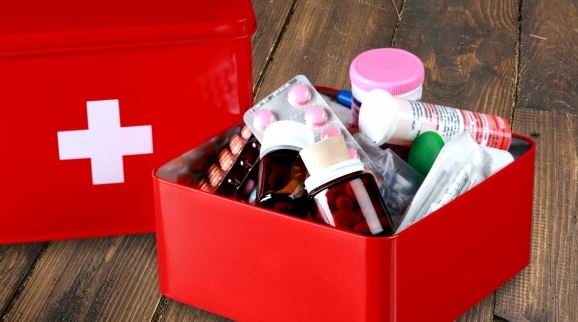Accidents, injuries, natural disasters, and health crisis happen. With the uncertain times today, it is more than ever important to be prepared.
This is why when it comes to caring for your elderly family member, it’s important that you have all the necessary supplies to help them in case of an emergency.

What is a First Aid Kit for Seniors
Having a first aid kit handy in your home allows you to respond quickly in any accident or emergency. The seconds you save with your fast response reduces the risk of injuries or complications–and could even save a life.
For the elderly, it’s important to have a first aid kit that can cater to their needs and to any common scenarios that they may find themselves in.
When building a first aid kit for seniors, it’s important to think of any possible scenarios or medical problems in the home environment of the senior. This may include:
- Slips and falls
- Burns
- Cuts, scrapes, and scratches
- Choking
- Heat stroke
- Hypothermia
- Insect bites
While many situations can be addressed by prompt first aid, it is still important to call emergency services or to take your elderly loved ones to the emergency room, especially for life-threatening situations.
The Basics in Your First Aid Kit
- Assorted bandages
- Gauze and tape
- Antiseptics, antiseptic wipes, and sanitizers or alcohol and peroxide
- OTC pain relievers
- Calamine lotion
- Fever reducer
- Cotton swabs
- Cotton balls
- Calamine lotion or insect bite relief
- Thermometer
- Medical gloves
- Antibiotic ointment and hydrocortisone cream
- Scissors
- Tweezers
- Hot and cold compress packs
While these are basics, seniors would have different needs and so, you need to customize your first-aid kit for them.
Here are what you can consider adding:
- Shears for cutting tape or gauze and for cutting away clothing in case of emergency
- Butterfly closures for cuts and when stitches are not an option for the elderly’s thin skin
- Self-adhering bandages to prevent damaging elderly’s delicate skin
- Transparent film dressings that stick to the skin and are gentler
- Paper tape that are not as irritating as standard bandages
- Non-stick gauze
You may also ask your elderly loved ones’ physician for any other products and essentials that you can add to your kit.
Other Things to Consider
You should also have the following handy:
- List of emergency phone numbers
- Contact information of family members
- Documents with medical history and medical consent forms
- Waterproof matches
- Flashlight and extra batteries
- Space blanket
- Pen and paper
- Sunscreen
- Insect repellent
- OTC painkillers
- Prescription medication (need to have regular fresh supply, as needed)
Caring for an elderly loved one has its own set of challenges, but that doesn’t mean you have to do it on your own. We understand you and we can help. Talk to us at Blessed Home to learn more.
Recent Comments